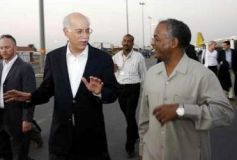Diplomacy still best hope to end Darfur crisis – US
Feb 8, 2007 (WASHINGTON) — Even though policymakers in both the Bush administration and Congress increasingly are frustrated by the Sudanese government’s reluctance to end the violence in Darfur, analysts agree diplomacy still offers the best solution to the crisis that began in early 2003.
 On February 8, President Bush’s Special Envoy to Sudan Andrew Natsios testified before the House Foreign Affairs Committee on the crisis in Darfur, saying the United States was “appalled by the atrocities of the war, particularly those against civilians.”
On February 8, President Bush’s Special Envoy to Sudan Andrew Natsios testified before the House Foreign Affairs Committee on the crisis in Darfur, saying the United States was “appalled by the atrocities of the war, particularly those against civilians.”
Since 2003, more than 200,000 people have died in Darfur while another 2.5 million have been displaced by the violence caused mainly by Jingaweit militias supported by the Sudanese government.
Since 2004, Natsios said, “The United States has made solving conflict in this region a priority. [And] our view remains that a negotiated way out of the crisis in Darfur … is the most desirable alternative and the option most likely to yield success.”
On his most recent trip to Sudan, Natsios told the lawmakers, “I spent two hours with President Bashir. [And] he expressed a willingness to engage with the international community on Darfur.”
Although there is little support for direct U.S. military intervention such as a no-fly zone over Darfur or a blockade of Sudan’s coast, suggestions born of frustration with both rebels and the government of President Omar al-Bashir range from increased support for negotiations to calls for more sanctions against the Khartoum regime.
The difficulty of diplomacy was recently born out by State Department spokesman Sean McCormack who on January 5 condemned “the bombing by Sudanese Armed Forces” of a town in which representatives of the African Union (AU) had just met with Darfur rebel commanders to urge them to abide by a ceasefire.
That action, McCormack said, “violates the Sudanese government’s pledge made in Addis Ababa on November 16, 2006, to facilitate the work of the African Union to achieve a strengthened ceasefire” in Darfur. (See related article.)
However, such attacks, said McCormack, “will not weaken the international community’s resolve to assist the suffering people of Darfur” through increased diplomatic efforts and more humanitarian assistance.
In a January 23 report on Sudan, Ted Dagne, a specialist in African Affairs with the Congressional Research Service, highlighted U.S. official interest in the crisis by saying, “The Bush administration and Congress … have been at the forefront in calling for an end to the crisis in Darfur and demanding accountability, especially since mid-2004.”
Dagne added in his report that, “U.S. financial support for the peace process and technical assistance during the talks [that led to the 2005 signing of the North-South Comprehensive Peace Agreement (CPA)] were considered by the parties and the mediators as critical.” (See related article.)
Also on January 23, the White House protested the Sudanese government’s arrest and “assault” of 20 members of the United Nations, the AU mission in Sudan (AMIS) and nongovernmental organizations operating in Nyala, South Darfur.
On the issue of sanctions, Congress passed the Darfur Peace and Accountability Act in fall 2006, which prohibits Americans from entering into certain financial and business relations with Sudan. The United Nations and European Union have also passed limited sanctions against the Khartoum regime while continuing to press for a U.N. force to augment the 7,000 AU peacekeepers already in the country. (See related article.)
Following its passage, House Foreign Affairs Committee Chairman Tom Lantos hailed the act, saying the situation in Darfur called for “sustained and intensive diplomatic efforts at the highest level.”
But at the February 8 Sudan hearing, Lantos called for something stronger: “I hope that tough sanctions on Khartoum will force the [Bashir] regime to allow an international civilian protection force to enter Darfur,” he said.
“If we wait much longer, there may be nobody left to protect in Darfur.”
In response to former Assistant Secretary of State for African Affairs Susan Rice’s drastic suggestion that the United States “should begin urgent military planning and preparation” for some type of direct intervention, ranking committee member Ileana Ros-Lehtinen said, “while I agree that in the face of genocide all options must be on the table, I would suggest that such an action must be one of last resort.”
Natsios assured the lawmakers at the Sudan hearing that “if we find the Sudanese government is obstructing progress” on a peaceful solution to Darfur and on implementation of the CPA,” the United States government will change its policy of negotiation and will pursue more coercive measures.”
(USINFO)
